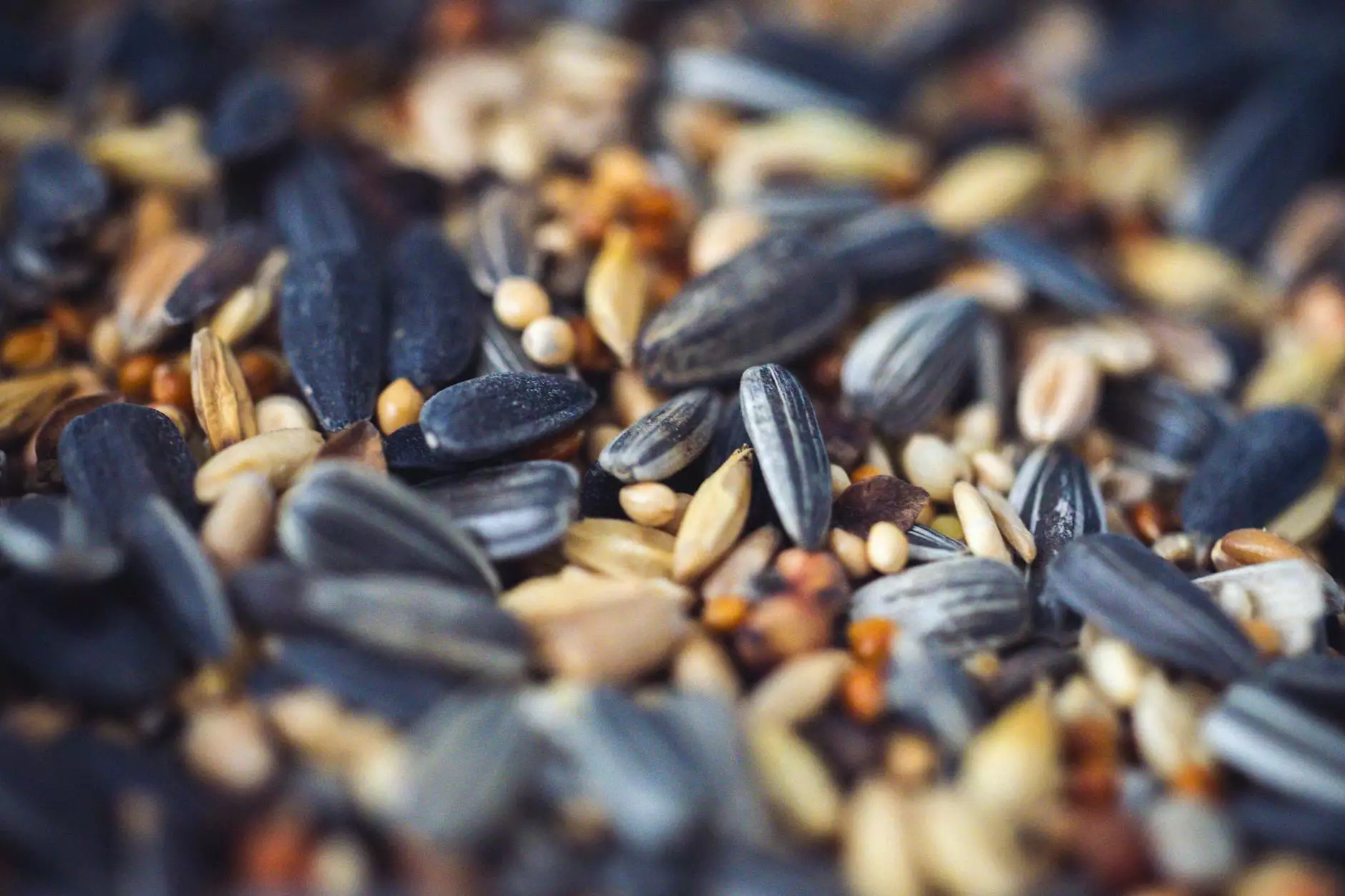Ultimate Guide to Feed for Birds

When it comes to caring for our beloved birds, one of the most crucial elements is ensuring they receive the appropriate feed for birds. In this comprehensive guide, we will explore various aspects of bird nutrition, types of feed available, and how to select the best options for your avian companions. Whether you are a pet owner, a bird enthusiast, or a pet store operator, understanding the importance of quality feed is essential.
Understanding Bird Nutrition
Birds, much like humans and other pets, require a balanced diet to thrive. Their nutritional needs vary significantly based on their species, age, and individual health requirements. Feed for birds can be categorized into several important nutrients:
- Proteins: Essential for growth and muscle development.
- Carbohydrates: Provide energy for daily activities and metabolism.
- Fats: Important for healthy skin and feathers, as well as energy reserves.
- Vitamins and Minerals: Vital for overall health, immune function, and strong bones.
Types of Feed for Birds
Choosing the right feed for birds can be overwhelming due to the plethora of options available. Here are the primary types of bird feed commonly found in pet stores:
1. Seed Mixes
Seed mixes are perhaps the most traditional form of bird feed. These mixes typically include a variety of seeds such as millet, sunflower seeds, and safflower. While seeds are a favorite among many birds, they should not be the sole source of nutrition since they may lack certain essential nutrients.
2. Pellets
Pellets have become increasingly popular in recent years. These are manufactured to provide a balanced diet in every bite, containing essential vitamins, minerals, and nutrients. Pellets greatly reduce the likelihood of selective feeding, where birds only eat their favorite seeds.
3. Fresh Fruits and Vegetables
Including fresh fruits and vegetables in your bird’s diet is a brilliant way to provide them with additional nutrients. Birds particularly enjoy leafy greens like kale, sweet fruits like apples, and root vegetables like carrots.
4. Treats
Occasional treats, such as nuts, dried fruits, or even specially formulated bird treats, can be given as a reward or for training purposes. However, it’s essential to limit these to avoid obesity.
Factors to Consider When Choosing Bird Feed
When selecting feed for birds, you must take several factors into account to ensure you are providing the best options for your pets:
1. Species-Specific Needs
Different bird species have distinct dietary requirements. For instance, a parakeet's diet may differ significantly from that of a cockatiel or an African Grey. Always research the specific needs of your bird species before purchasing feed.
2. Age of the Bird
Young birds may require a higher protein content for growth, whereas older birds might benefit from a different balance of nutrients tailored to their health needs.
3. Quality of Ingredients
Always opt for high-quality feeds that list whole ingredients, avoiding those with artificial additives, preservatives, and fillers. The higher the quality of the feed, the more beneficial it will be for your bird's health.
Common Mistakes to Avoid When Feeding Your Birds
Ensuring your birds are well-nourished is not just about providing them with food. Here are common pitfalls to avoid:
- Overfeeding: Providing too much food can lead to obesity in birds. It’s crucial to measure portions based on your bird's size and dietary needs.
- Ignoring Freshness: Feed that has gone stale or moldy can cause health problems. Always check expiration dates and store food in a cool, dry place.
- Only Providing Seeds: Relying solely on seed mixes can lead to nutrient deficiencies. Incorporate pellets and fresh foods into their diet.
How to Introduce New Feed for Birds
It is essential to introduce new feed for birds gradually to avoid digestive upset:
- Start by mixing a small amount of new feed with their current food.
- Gradually increase the proportion of the new feed over a week or two.
- Observe their eating habits and health during the transition.
Feeding Different Types of Birds
When it comes to providing feed, different types of birds have specific preferences. Here are some tips for feeding various bird species:
1. Parrots
Parrots enjoy a mix of seeds, pellets, nuts, and fresh fruits. Their diet should closely resemble their natural foraging habits, which include a variety of food items.
2. Canaries
Canaries thrive on a good seed mix supplemented with fresh greens and occasional fruits as a treat. They benefit from a high-fiber diet.
3. Finches
Finches also prefer a mixed seed diet, but typically enjoy millet and can also benefit from small pieces of fruits and vegetables.
Storing Bird Feed Properly
Proper storage of feed for birds is essential for maintaining its freshness and nutritional value. Here are tips for effective storage:
- Keep feed in airtight containers to prevent exposure to air and moisture.
- Store in a cool, dry place to avoid the growth of mold or spoilage.
- Label containers with purchase dates to ensure you use the oldest feed first.
Conclusion: Nourishing Your Feathered Friends
Understanding the nuances of bird feed is key to providing your feathered friends with a healthy lifestyle. From choosing the right feed for birds to considering their specific needs, every aspect plays a crucial role. Remember that a well-fed bird is a happy bird! Incorporate seeds, pellets, fresh fruits, and treats into their diet while avoiding common mistakes. By making informed decisions and putting the time into researching, you can ensure that your birds relish the food they consume, ultimately leading to their well-being.
If you’re looking for high-quality feed for your birds, visit rareexoticbirds.com.au. We offer a variety of pet foods, including the perfect feed for birds, to help you maintain a thriving environment for your pets.









